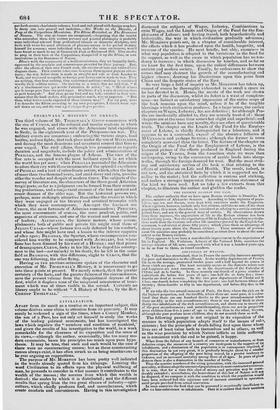THIRLWALL'S HISTORY OF GREECE.
THE third volume of Mr. THIRLWALL'S Greece commences with the rise of Cimoss and the colonial and insular contests in which he was engaged, and closes with the Athenians' fatal expedition to Sicily, in the eighteenth year of the Peloponnesian war. The military events are numerous; embracing the various sieges, land battles, and sea fights, that took place under the son of MILT! ADES, and during the most disastrous and unnatural contest that Grace ever waged. The civil affairs, though less prominent as regards duration and magnitude, include the policy and administration of PERICLES, and the famous plague of Athens. The view of the fine arts is occupied with the most brilliant epoch in art which the world has yet seen ; when PERICLES persuaded the Athenians to adorn their city with those monumentsof the splendid excellence of PHIDI AS and a host of subordinate artists, whielsafter the lapse of more than two thousand years, and amid decay and ruin, provoke alike the wonder and despair of modern times. The subjects of the survey of literature are, the characters of the three great Athenian tragic poets, so far as a judgment can be formed from their remain- ing productions, and a conjectural account of the lost satirical and comic dramas of the older age. But the historical persons are, perhaps, more strikingly attractive than either the events in which they were engaged or the literary and artistical triumphs with which they were contemporary. Amongst the foremost are -CtmoN, the most fortunate of Athenian commanders ; PERICLES, the most consummate of orators, the most prudent, politic, and sagacious of statesmen, and one of the wariest and most cautious of leaders; ALCIBIADEs, the historic meteor, whose accom- plishments both of public and private life might rival those of Just us CEsait—whose fortune was only defeated by his conduct, and whose fate might have read a lesson to the inferior empirics of after ages; BRASIDAS, the Spartan, whose contemporaries con- sidered him worthy to be compared with ACHILLES, but whose fame has been dimmed by his want of a HOMER; and that prince of demagogues, CLEON, lucky in his life, for he duped his country- men to the last—not unlucky in his death, for he !OH in the sante field as BRASIDAS, with this difference, slight to CLEON, that the one was following, the other flying. Having on two previous occasions spoken of the character and execution of Mr. THIRLWALL'S History, it is unnecessary to go into these points at present. We merely remark, that the greater certainty of the facts, and the greater fulness of the circumstances, save the present volume from the disquisitional dryness of the first, whilst it displays none of the misplaced minuteness of treat- ment which was at times visible in the second. Certainly no library ought to be without "A History of Greece, by the Rev. CONNOP THIRLWALL."


























 Previous page
Previous page